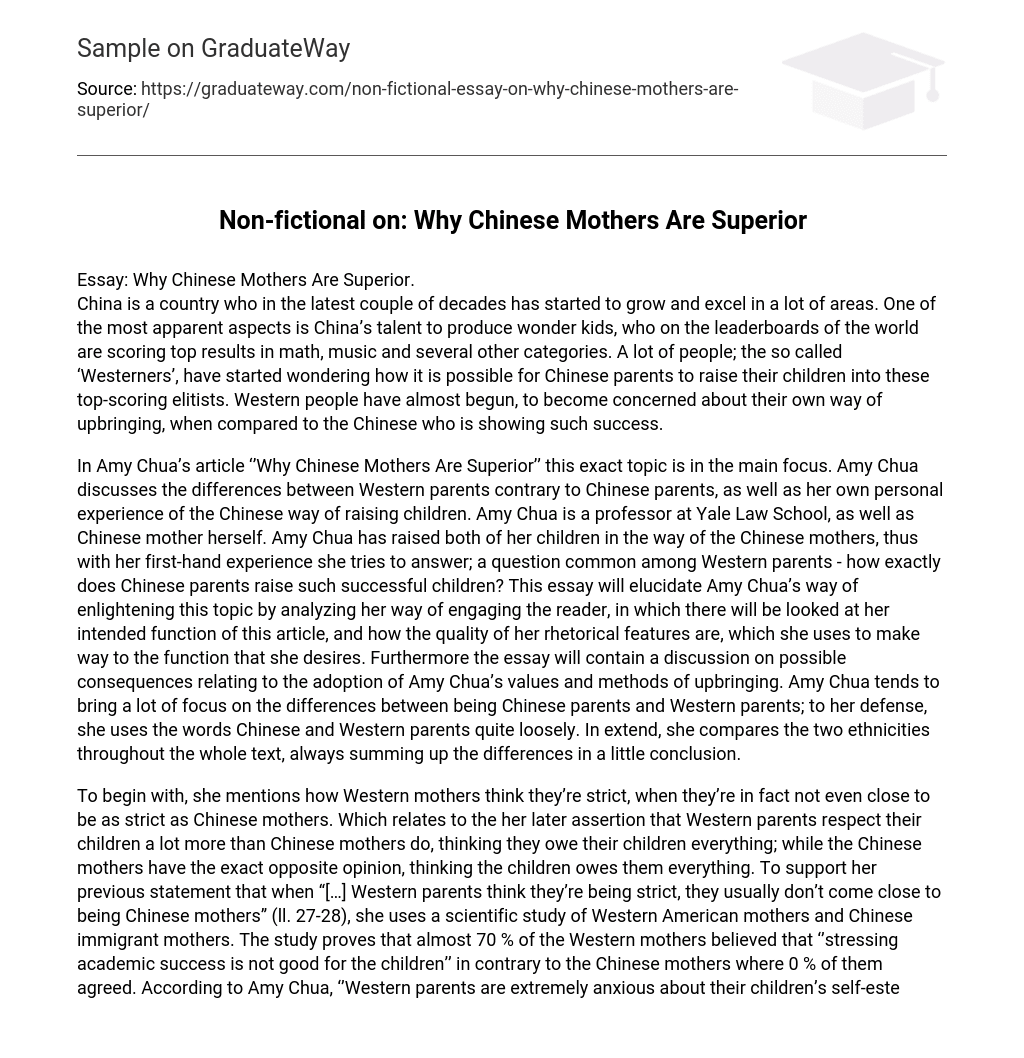Essay: Why Chinese Mothers Are Superior.
China has achieved remarkable growth and success in several areas in recent decades. A notable accomplishment is China’s ability to raise highly skilled children who consistently excel in global fields like math and music. This has prompted many individuals, especially those from western nations, to contemplate the strategies employed by Chinese parents to nurture such high-achieving individuals. Consequently, Westerners are becoming increasingly concerned about their own parenting approaches when compared to the impressive success demonstrated by the Chinese.
In her article titled “Why Chinese Mothers Are Superior,” Amy Chua explores the distinctions between Western and Chinese parents, drawing on her personal experience as a Chinese mother and professor at Yale Law School. Chua employs rhetorical features to enlighten readers about how Chinese parents raise successful children. This analysis will examine these features and their impact while discussing potential consequences of adopting Chua’s values and parenting methods. Throughout the article, Chua consistently highlights the disparities between Chinese and Western parenting, occasionally using these terms loosely to summarize their differences.
The author begins by discussing the beliefs of Western mothers versus Chinese mothers in terms of strictness. Western mothers consider themselves strict, but are not as strict as Chinese mothers. The author also states that Western parents respect their children more than Chinese mothers do, with Western parents thinking they owe their children everything while Chinese mothers believe the opposite. To support this claim, the author cites a scientific study comparing Western American mothers and Chinese immigrant mothers. The study found that almost 70% of Western mothers disagreed with stressing academic success for their children, while no Chinese mothers agreed with this. According to Amy Chua, Western parents are highly concerned about their children’s self-esteem. She uses an example of how a Western parent would praise a child who brings home an A-minus on a test.
The text demonstrates the contrasting approaches of Western and Chinese mothers in terms of emphasizing success and considering a child’s self-esteem. Amy Chua relies heavily on providing examples to support her arguments, likely due to her personal experience of raising her own daughters using the methods of a Chinese mother. Her use of rhetorical features primarily involves using examples to highlight differences and comparisons between the two styles of parenting. For instance, she shares a story about Lulu to illustrate how dedication and hard work can lead to worthwhile achievements. This serves to reinforce her point that Western parents often overly concern themselves with their children’s self-esteem, further highlighting the disparities between the two approaches. These examples hold particular credibility as they are based on Chua’s firsthand experience.
Furthermore, Amy Chua employs typographic and argumentative features, albeit to a limited extent. A demonstration of typographic feature can be found on the first page, where she utilizes a bulleted list to outline the restrictions imposed on her children. The purpose of this list is to attract the reader’s attention and facilitate their understanding of the extent to which rules were enforced. Additionally, the use of a bulleted list conveys the information in an educational manner. Another argumentative feature employed by Chua is the incorporation of a scientific study. By integrating such evidence, she establishes credibility, leading readers to perceive her as trustworthy. This argument is noteworthy as it is supported by experts in the field. In terms of persuasion techniques (Pathos, Ethos, and Logos), Chua primarily relies on Logos and Ethos. In respect to Logos, her reference to the scientific study effectively appeals to readers’ sense of logic due to its reliance on facts and statistics. Consequently, Ethos serves as Chua’s main tool for persuasion. She exudes authority and commands respect by virtue of her expertise and status.
With her position as a Professor at Yale Law School and the authority of a Chinese mother, she is undoubtedly the ideal person to delve into this subject matter. One intriguing question arises: what if Western parents were to adopt Amy Chua’s child-rearing approach, and what would be the resulting consequences? These outcomes may seem obvious or not. When addressing this question, many tend to focus on their own community, assuming that these methods are only applied within it. Consequently, the specific family adopting such methods would excel and stand out like Amy Chua’s family. However, if we expand our discussion to encompass a global adoption of the Chinese upbringing style, unforeseen consequences become a primary concern. If every child is raised with the goal of surpassing others, the gap between superior and less intelligent children would be minimal. As a result, equal intelligence would also mean equal lack thereof.
In order for a world to exist, it needs both intelligent and unintelligent individuals. Additionally, if mothers emulate Amy Chua’s approach of limiting their children’s participation in certain social activities, the future might entail an isolated existence where connections are forsaken in pursuit of knowledge.





